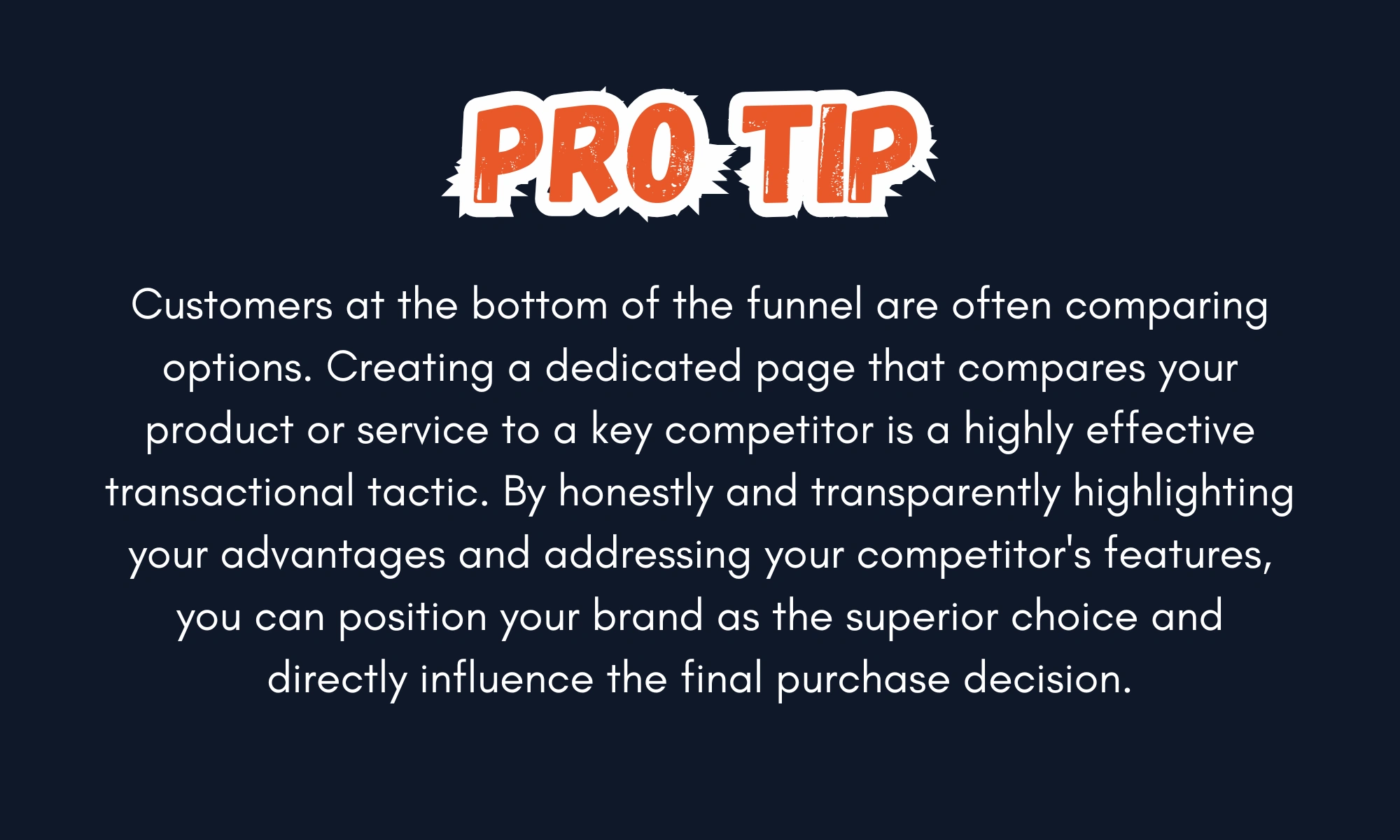From Clicks to Customers: How to Master Transactional Keywords

Some customers are just looking for information, but some have their credit card in hand. The latter are searching with high intent, using what we call transactional keywords. These aren't just search terms; they are a clear and direct signal that a user is ready to buy, book, or sign up. For any business focused on a measurable return on investment, mastering these keywords isn't optional; it's the most direct path from a search query to a paying customer.
This article will break down what transactional keywords are, why they are your most valuable SEO asset, and provide a strategic blueprint for identifying, targeting, and converting them. We'll show you how to transform your website from a generic online presence into a powerful engine for sales and lead generation.
Understanding the Power of Intent
To grasp the value of transactional keywords, you need to think about the user's mindset. Every search query falls somewhere on a spectrum of intent, from pure information gathering to a clear desire for a transaction.
- Informational Queries: The user is seeking knowledge. Examples include "what is a mortgage," "how to plant a rose," or "how to change a tyre."
- Navigational Queries: The user is looking for a specific website or page. Examples include "Amazon login," "BBC News," or "Facebook."
- Commercial Investigation Queries: The user is in the research phase, comparing different options. Examples include "best digital camera 2024," "SEMrush vs Ahrefs," or "Samsung Galaxy S24 review."
- Transactional Queries: The user is ready to take action. This is where transactional keywords live.
A user searching for "best digital camera" is a valuable prospect, but a user searching for "buy Canon EOS R5" is a hot lead. The latter knows exactly what they want and is ready to make a purchase.

The Anatomy of a Transactional Keyword
Transactional keywords are defined by the action-oriented language they contain. They leave no doubt about the user's intent. Look for queries that include explicit transactional modifiers like:
- Verbs: "buy," "purchase," "order," "hire," "book," "rent," "subscribe"
- Product/Service Names: "website audit," "plumber London," "yoga mat," "CRM software"
- Pricing/Cost: "cost of a website," "freelance writer rates," "HubSpot pricing"
- Promotional Terms: "discount code," "deals," "sale"
- Location-Specific Terms: "coffee shop near me," "web design agency in Manchester"
The power of these keywords lies in their specificity and the undeniable intent they communicate. They are the direct link between a search and a sale.
Why Transactional Keywords are Your Most Valuable Asset
While it's tempting to chase high-volume informational keywords, focusing on transactional ones offers a more efficient and profitable strategy.
- Sky-High Conversion Rates: Traffic from transactional keywords is pre-qualified and highly motivated. These users are actively looking for a solution and are far more likely to convert. This means you need fewer visitors to generate a sale, dramatically increasing the efficiency of your marketing spend.
- Clear Path to Revenue: Unlike informational content, which can take a long time to influence a purchase, transactional keywords offer a direct line to revenue. This makes it incredibly easy to measure the return on investment (ROI) of your SEO efforts.
- Lower Competition: While broad keywords are highly competitive and dominated by large players, transactional keywords are often more specific and less crowded. This provides a clear opportunity for smaller businesses to rank without having to outbid or out-authority industry giants.
- Deeper Customer Insights: The specific search terms a user uses to find you at the moment of conversion provide invaluable data. They reveal the exact problems your customers are trying to solve and the language they use, which can inform not just your SEO strategy but also your sales messaging and product development.
.webp)
A Strategic Blueprint for Targeting Transactional Keywords
Mastering transactional keywords requires a deliberate and precise approach. It's about providing the right information, at the right time, to a user who is ready to act.
Step 1: Intent-Based Keyword Research
Don't rely on guesswork. Use professional SEO tools to find the transactional keywords your audience is using. Look at your competitors to see what terms they are ranking for and what pages they are using to convert traffic.
- Analyse Existing Traffic: Look at your current website traffic in Google Analytics or a similar tool. Identify the keywords that are already driving conversions. These are your most valuable assets.
- Use Keyword Modifiers: Start with your core product or service and add transactional modifiers. If you sell sports shoes, search for "buy men's running shoes," "women's running shoes sale," or "purchase Nike running shoes."
- Spy on Competitors: Use a professional tool to see which transactional keywords your competitors are ranking for. Pay attention to the pages that are driving them the most organic traffic and conversions.
Step 2: Create Conversion-Focused Landing Pages
Once you have your list of keywords, you need to build content specifically designed to convert. This is not the place for long, generic blog posts. These pages need to be direct and persuasive.
- Write Compelling Copy: Your copy should be persuasive, addressing the user's final doubts and clearly articulating your unique selling proposition (USP). Focus on benefits, not just features.
- Include a Clear Call to Action (CTA): The purpose of the page should be obvious. Use a prominent, compelling CTA button like "Book Your Free Consultation," "Get a Quote," or "Buy Now."
- Build Trust: Incorporate trust signals like customer testimonials, star ratings, case studies, security badges, and professional certifications. When a user is ready to buy, they need to feel confident in their choice.
Step 3: Optimise On-Page Elements for Conversion
Optimising your page for transactional keywords goes beyond just using the right phrases. It's about making the page a seamless and trustworthy experience.
- Use Keywords in Key Locations: Naturally weave your target keyword into the page title, headings (H1, H2), and the first paragraph.
- Implement Local SEO: If your business has a physical location, ensure your page has accurate NAP (Name, Address, Phone Number), an embedded Google Map, and schema markup to capture high-intent "near me" searches.
- Focus on Page Speed: A slow-loading page will kill a conversion. Ensure your transactional pages load instantly, especially on mobile devices.
.webp)
Step 4: Use a Strategic Linking Strategy
Internal and external links can significantly boost the authority and visibility of your transactional pages.
- Internal Linking: Link from your informational and commercial investigation content to your transactional pages. This passes authority and guides users who are moving down the sales funnel. For example, a blog post titled "How to choose a digital marketing agency" should link to your "Services" page.
- External Links: Building high-quality backlinks to your transactional pages from other reputable websites is a powerful signal of authority to search engines.
Measuring Success: Beyond Clicks
The success of your transactional keyword strategy isn't measured by traffic but by conversions. The key performance indicators (KPIs) to track are:
- Conversion Rate: The percentage of visitors who complete the desired action.
- Revenue from Organic Search: The total revenue generated from the keywords you're targeting.
- Cost Per Acquisition (CPA): The cost of acquiring a new customer from organic search, which should be significantly lower for transactional keywords.
By focusing on these metrics, you can clearly demonstrate the tangible value of your SEO efforts to your business.
Conclusion: The Direct Path to Growth
The journey from a broad search query to a loyal customer is long and filled with distractions. By strategically focusing on the most valuable and high-intent keywords, you are not just optimising for an algorithm; you are directly addressing the needs of a user who is at the most critical stage of the buyer's journey.
Transactional keywords are your most valuable SEO asset because they are a direct line to revenue. By creating conversion-focused content, building trust, and meticulously tracking your results, you can turn a trickle of high-intent traffic into a predictable and profitable stream of new customers.
.webp)
References:
https://www.google.com/intl/en_us/search/howsearchworks/how-search-works/ranking-results
.avif)






